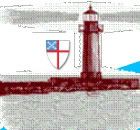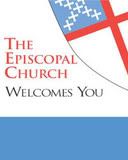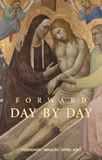Wednesday, July 23, 2008
Sermon for July 27th, 2008
Sermon for July 27, 2008
St. James’ Goshen
Parish Picnic
Arthur Hadley
Here we are near Lake Wawasee much like when Jesus was teaching the people of Capernaum. Jesus came from Nazareth where he grew up.
The people of Nazareth, his family, brothers, sisters, cousins, rejected him, even tried to kill him. But his teachings drew a following in the sea side town of Capernaum where he called Andrew and his brother Peter who were fishermen, and another set of brothers, James and John sons of Zebedee. At first Jesus taught in the local synagogue, about 3 blocks from the coast of Sea of Galilee. Those who wanted to hear Jesus grew too large for the synagogue, and Jesus went down to the sea and got in one of the boats and went out a little so more people could hear him.
Jesus taught using a series of parables: seed sown on pathway, rocky soil, among the weeds and on good ground, and then seeds sown on good soil but weed seed still sprouted and the weed and weevil had to be purified from the harvested grain. In the gospel lesson appointed for today we have four short parables that try to describe the Kingdom God is like:
A small seed that grows into a great tree.
A small amount of yeast can become the leaven for a bushel of flour.
A small Pearl that is more valuable than every thing else you can own.
Going fishing in the sea and catching so many fish the nets would begin to break and the boat so full that it might sink. At the end of the age when God comes to judge the good can be sorted from the bad fish.
The parables Jesus used could easily be understood by those who came to hear him. They were stories of farmers planting seed, and stories of fishermen, and merchants and women baking bread. The simple story of the Kingdom of God is like things you already know. A very little bit of seed or yeast can grow into greatness. A little seed can multiply a hundred fold, or a little seed the size of a mustard seed can grow into a great big mulberry tree, or a small amount of yeast can grow in the flour to become a mass of dough for loaves of bread. And even if weeds grow up and evil weevil infect the grain it can be sorted out at the end and purified. We do not try to condemn the weeds and root them out now, but wait for God to sort it all out at the end of time, just like the fishermen do when the have a large catch;they haul it all in and sort out the good from the bad later.
The apostles Andrew, Peter, James and John and all the rest heard Jesus tell these simple stories to explain God’s loving gift of salvation, A New Testament , a Gospel, good news. After Jesus’ death and resurrection the Apostles retold the stories again and again and the followers of Jesus continued to grow upsetting status quo and threatening the traditional leaders. King Herod tried to stop the followers of Jesus by executing James and arresting Peter. But the followers of Jesus kept telling the parables and preaching that the Kingdom of God is now, God loves us now. We are given salvation now. And we keep telling the stories in ways all people, all over the world, can understand.
Thanks be to God.
Tuesday, July 15, 2008
Sermon for July 20th, 2008
Sermon for July 20, 2008
Proper 11, A
St. James’ Goshen IN
Arthur Hadley
In today’s Gospel we have heard the parable of the Wheat and the Tares. How lucky we are in the timing of the lectionary; we have harvested wheat this week. Those big combines turn through the fields cutting, thrashing, winnowing the wheat grains from the straw that is left behind in the field. What a difference mechanization makes. In the past first the wheat would have been cut and tied into bundles and then stacked into shocks. Later the shocks would have been gathered and thrashed. In the Middle East some thrashing is still done by putting the shocks of wheat bundle by bundle on the stone thrashing floor and having an ox or ass pull a wooden sled over the wheat separating the grain from the straw. The straw was removed from the stone thrashing floor, revealing the grain and the chaff, the dry covering of the grain. The chaff was removed from the grain by winnowing, tossing the chaff and grain into the air and letting the wind blow away the light chaff and heavier grain falling back to the thrashing floor.
If weeds grew in the wheat field, then the weeds had to be separated from the wheat before thrashing. The two most common weeds growing in the wheat fields of the Middle East are Syrian scabiosa, a smaller version of the garden blue scabiosa daisy, and a grass that grows much like wheat but has seed about half the size of wheat. The scabiosa seed is extremely bitter and the grass seed was thought to be poisonous.
So in the story Jesus told, the Sower of last week had sowed the wheat and Tares; weeds came up in the field. What should they do? Go out and pull the weeds or wait until the wheat was harvested. The wise owner told them to wait until harvest, then the wheat can be separated from the weeds. So the thrashing floor became the point of separation, separating the weeds from the wheat, and then separating the wheat grain from the straw, and finally separating the grain from the chaff that surrounded the wheat grain in the ear or head of wheat. To be very sure that the wheat grain was clean of all chaff, and to kill any insect eggs laid on the grains of wheat, those little insects that we all know as wheat weevil, the final step of the grain harvest was to make a fire of the wheat straw and toss the grain through the fire. The chaff would burn with a great flash, the heavier grain would pass through the flames and the evil weevil eggs would be killed in the flash of flame.
Jesus used this simple every day story of harvest to describe the coming of the Kingdom of God. That grain that was sowed and yielded 30, 60 even 100 fold, would be harvested by the master. The weeds that grew up with the good wheat would be separated and burned in the fire. That would further clean the good from the chaff and evil weevil that could cause ruin to the good wheat.
Each of us sin. We live in a world of sinfulness. But God, like the master of the field, can separate the good from the bad. Taking the sin and evil in the world in which we live, and burning it away like the chaff and separating us from the evil weevil that is on us, leaves us pure and holy for the Kingdom of God. Our sin is taken away.
Thanks be to God.
Thursday, July 10, 2008
Sermon for July 13th, 2008
Sermon for July 13, 2008
St. James’ Goshen, IN
Arthur Hadley
For the next several weeks the Gospel lessons will be about Jesus using stories about growing seed, making bread and using bread to feed the hungry people. Jesus used stories, parables, about very common well known everyday things to explain the Kingdom of God. He used what people knew to explain something that they did not know. When trying to describe something unknown to someone you always have to start with something they already know. You and I know that the first automobiles were called "Horseless Carriages". When my two year old grandson first saw an Amish buggy, we had to explain to him that the horse and buggy were like automobiles pulled by a horse. And he would say with great glee "horse - e - buggy". A hundred years ago automobiles had to be described as a horseless carriage, but today a horse and buggy has to be explained as a horse pulling an automobile. Some of the stories that Jesus told explaining that the Kingdom of God is like something people knew really do not work very well in our society. Today’s stories still work fairly well.
A sower went out to sow some seeds. Some of the seed fell on a path and birds came and ate the seed. Other seed fell on rocky ground; the seed quickly sprouted, but had no soil for the roots and the sprouted seed withered away. Other seed fell among the thorns and weeds which grew quickly, choking out the seedlings. But other seed fell on good soil and brought forth grain some one hundred fold some sixty and some thirty.
This simple story of the sower spreading seed was understandable to the people waiting to hear Jesus as he taught near the coast of the Sea of Galilee in northern Israel. The fields in Galilee near the fresh water lake of Galilee are flat, fertile and irrigated out of the lake and Jordan River, but as you move away from the coast lands into the hills going up to Nazareth, the land becomes rock strewn and filled with briers . The people hearing Jesus knew those fertile fields and rock strewn hills. They knew that wheat grew best in the fertile fields. But Jesus was using what they knew to explain that he was talking about the Word of God, is like the seed he was sowing: some of those hearing the Word of God were like the pathway and the birds would come and quickly eat the seed. Others were like rocky soil and others like soil already growing weeds and thorns. Some who hear the Word of God simply would not get it, like the seed on the pathway eaten by the birds. Some would hear the word and allow it to sprout, but it would soon wither and others would have the growing seedling be crowded out by weeds and thorns, the cares of the world. But some will hear the Word of God and with them it will sprout, grow and multiply by 30, or 60 or even by 100.
Wheat is a wonderful example of the multiplication of the seed to harvest. In good soil a seed of wheat will send up more than one stalk of grain, sometimes two some times three and maybe even four or five. Each stalk can produce a head with thirty to fifty new seeds. We plant about a half bushel of wheat seed per acre and expect to harvest more that fifty bushel per acre….a multiple of 100.
So the person who hears the Word of God and allows it to grow in a fertile mind, heart and soul can produce Thirty, sixty even one hundred fold. Jesus was talking to many people and He knew some would not hear or understand, some would try but fail to grow, but some would really receive the Word of God and make it grow.
And the Word of God has grown from those who heard Jesus in Galilee to Goshen.
Thanks be to God.
Thursday, July 3, 2008
Sermon for July 6th, 2008
St. James’ Goshen IN
Arthur Hadley
But Paul sees that the life, death and resurrection of Jesus frees humanity from the cycle of law, sin and death by giving humanity a new life and peace in the Spirit of God.
Jesus said Come to me, all who labor and are heavy laden, and I will give you rest. Take my yoke upon you, and learn from me; for I am gentle and lowly in heart, and you will find rest for your soul. My yoke is easy, and my burden is light.
The simplicity of Christianity sometimes takes on great complications from the Old Testament and later church ruling that Jesus and Paul were working very hard to avoid. The yoke of Christ is easy, my burden is light, accept life and peace. We need to trust in God to meet our needs, perhaps not all of our wants, but our needs.
Many years ago we were traveling in western Wales. One day we had a woman of maturity as our guide walking the Welsh mountain pilgrim trail leading toward St. David’s Cathedral. Our guide carried a lovely wooden walking stick. I asked her where I could buy such a wonderful walking stick. She pulled herself up to her total four foot 10, and assured me that in Wales one does not buy a walking stick God provides the proper stick at the proper time. You either find a stick or grow a stick, but you certainly do not buy a walking stick.
A few years later I was on a week retreat at a Trappist monastery, in the hills of Kentucky It was a rainy week, but I walked in the hills surrounding the monastery. I was about 3 miles away from the monastery walking along a ridge. Oops I slid down about 15 feet, badly bruising leg and pride. I needed a walking stick. I reached out my hand to find a bit of a brace to stand up. And there was my walking stick It has a place on top to hold my thumb and a bit of a twig that fits on my hand and acts as a pivot; so the pivot point allows the stick to rock as I walk. I had a need, no long a want, and there was my walking stick.
Subscribe to Posts [Atom]








